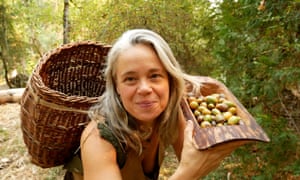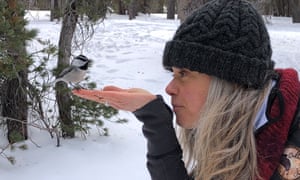Left to fend for herself on Arctic land, with only 10 pieces of gear – among them a sleeping bag, a pot, and a bow and arrows – Woniya Thibeault didn’t just want to survive. She wanted to find joy in the process of surviving.
Scattered miles apart in the same rugged wilderness were nine other contestants looking to outlast one another and win big on the History Channel’s popular survival reality series Alone. In it, contestants compete to stick it out for the longest time with limited resources – all have the option to tap out if it gets too much. The prize money – $500,000 – would have changed Thibeault’s life, but winning wasn’t her top priority. She was there for the experience.
The season she starred in started streaming on Netflix during the pandemic, when watching contestants grapple with exponentially more intense isolation started to feel as familiar as it did compelling.
Now, having come second in the show, the last woman standing that season, Thibeault is teaching a course in basic survival skills. In eight weeks, students learn how to start a fire, tie knots, build rudimentary shelters and make medicines and food stuffs like Yerba Santa tinctures and sauerkraut.
In Alone, Thibeault is first introduced savoring the chance to lick sap directly from a tree. It is immediately clear she will revel in being castaway, potentially for months, with no company other than the cameras she used to film herself. “It’s so sweet and delicious,” she marvels, joking: “Woniya out in the woods by herself making out with birch trees.”
Kitted out in buckskin clothing she made herself, the then 42-year-old ancestral skills teacher described herself as “a smallish woman coming at [survival] from a place of relationship rather than brute strength and dominance”.
After weeks of starvation, she joked as she cleaned poop from the frozen rabbit intestines she’d saved for fish bait so she could cook and eat them. Every time she had food, which wasn’t as often as she hoped, she’d express thanks and offer a bit to the ancestors. She’d sing the sun down every night, and once a week, she had a dance party.
When we first sit down to talk on Zoom, she tells me the purpose of these rituals of gratitude. “[I was] taking some time to just be in joyful expression of the beauty of the life I was living,” she says, sitting among bundles of willows and baskets of acorns in the craft studio she rents in Nevada City. She is wearing a brown T-shirt over a home tanned buckskin skirt, deer antlers dangling from her ears.

The continuous practice of gratitude is in keeping with Thibeault’s ethos, summed up by the portmanteau “surthrival”. “When we use the word ‘survival’,” she says, “it implies that the world is somehow out to get us. That we have to grit our teeth and endure it, to survive against all odds. That’s the polar opposite of my approach, which involves a sense of belonging … The ‘survival mentality’ is actually detrimental to our survival.”
Attended by more than a hundred people worldwide, Thibeault’s class focuses on specific skills – handcrafts, plant medicine and hide tanning. Some of us have come to the class as novices – people like me without much wilderness experience who were inspired by Thibeault on Alone; others are longtime members of the ancestral living skills community who already use deer brains to tan hides and maintain their knives with bear fat.
As a vegetarian, I skip most of the meat- and hide-based parts of the course, knowing they aren’t relevant to my life. I do, however, give myself the challenge of watching others on our online class approach the task, as Thibeault recommends coming at it from a place of curiosity instead of fear or disgust, to look for beauty inside moments we might otherwise consider “gross”.
She points out the iridescence of a sheet of deer fascia, reminding us that we can learn about our own bodies by looking at those of other animals. She celebrates the “gorgeous subtle shades of difference in organ colors”, reminding us to see livers and hearts and lungs as wonders instead of flinching, as I did.
“The edge of comfort is where the most learning can take place,” she says.
•••
While many of the contestants on Alone wrestled mightily with distance from the world they knew, Thibeault (who finished second place, tapping out as a birthday present to herself after 73 days) showed solitude doesn’t have to mean lack of connection. She harvested plants from clusters that needed thinning, sang to the water as she fetched it, and thanked the sun for waltzing with her. She maintained a sense of gratitude and playfulness, dressing up like a rabbit for Halloween, even when she hadn’t eaten in days and was having trouble getting warm inside the double-walled A-frame shelter she had constructed.
Her lifestyle was ample training for the show: she has spent most of her adult life living off grid, with minimal electricity and no refrigeration, growing and gathering as much of her food and material goods as possible, and making a lot of what she needs with her own hands.
“Being able to shift your mindset so that you don’t feel threatened actually makes you more aware,” she explains. “It gives you better control of your faculties. It reduces your caloric need because being in a panic state with your heart beating fast actually burns through your calories faster. So there’s all these ways that not being survival-oriented are ironically better for survival.”
As a young girl, Thibeaut fantasized about living as a hunter gatherer, her play revolving around harvesting food and building shelters.

She didn’t know it was possible to live in such a way in modern America until, as an undergraduate at UC Santa Cruz studying biology and environmental studies, she took a revelatory eight week field course backpacking around Idaho and learning “primitive living skills” (a term she dislikes, preferring “ancestral living skills,” which respects the sophistication and nuance such skills require).
During the course, students picked a trail name for the summer, and at 19, not yet understanding cultural appropriation, Thibeault chose Woniya from a book of Lakota stories, and kept it after the life-changing trip.
“I was naive and unaware of my privilege and it never occurred to me that it was a disrespectful choice for a young white girl to give herself a name from a culture not her own that she didn’t have permission to use,” she writes in her forthcoming book about buckskin sewing. Once she realized the impact of this choice, she considered changing her name yet again, but decided not to let herself off the hook. “It’s important for me to have culpability when talking about the subject,” she says.
Thibeault tries not to replicate the appropriation that many white people in the ancestral living skills community engage in today. She uses modern tailoring in her buckskin designs, avoiding elements like fringe and beading, focuses on teaching Stone Age skills that are not from any particular tradition but part of everyone’s human lineage, and offers scholarships and discounted rates to her classes for indigenous, Black, LGBTQ+ and other underserved participants.
In class, Thibeault gives us a crash course in “bird language” and I find myself deciphering the difference between when the birds are comfortable, and when they sense a threat; between their territorial squawking and cries of alarm.
We are told to keep a “butter journal”, packed with observations “that make your life rich and delicious and fulfilling.” Mine is quickly filling with doodles of the creek’s shifting wrinkles and the emergence of snow berries and tiny yellow pine cones.
When we keep our senses awake and receptive, we can be what Thibeault calls “better animals”, more fully alive in our bodies and in the world. Knowing my reinvigorated relationship with the land can support my wellbeing during and beyond the pandemic, I feel like one.
Other students find themselves going through important changes, too. Shannon, who started the class as a vegan, was so inspired by Thibeault she skinned and butchered a deer she found as roadkill. If someone told her she’d be doing this a year ago, she says she would have thought they were being ridiculous.
Tereza, who joined the class from Prague, has tanned her first ever buckskin and plans to make it into a skirt. Henrietta, a student in New Zealand, told me the class helped her “feel my own agency and trust in my ability … It’s not an exaggeration to say it’s been life changing for me.”
That is Thibeault’s intention with these classes: to help others develop a deeper connection with nature, and remember that through it, they’re never alone.
from Lifestyle | The Guardian https://ift.tt/3qZXdHT
via IFTTT

comment 0 Comment
more_vert